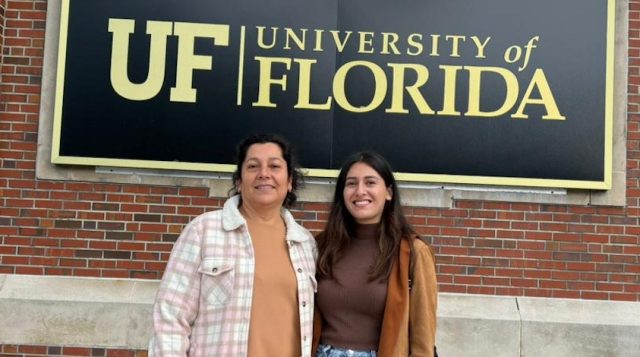Food Science is the study of techniques and systems to ensure food is safe, available, wholesome, and delicious. Food scientists use chemistry, biochemistry, microbiology, nutrition, and engineering to understand and manage food composition, processing, and safety.
The Ph.D. program in Food Science is a multidisciplinary program consisting of Food Chemistry, Food Processing and Engineering, and Food Microbiology and Safety. Students are expected to obtain a breadth of food science knowledge by taking courses in all program areas with the majority of courses stressing on the of the three areas of emphasis.
Learn more about the Ph.D. in Food Science on the UF Catalog website, including information on requirements for the degree, lists of courses, and student learning outcomes.
Current Food Science graduate student?
Check Canvas for graduate forms, program plans, rubrics, seminars, the Nutritional Sciences graduate program handbook, checklists for graduation, and more.
-
Quick Facts
Background
- The graduate programs of the department apply established scientific principles and methods to better understand factors that impact food science and nutrition.
- Faculty in the department write research proposals that get funded by an agency or organization to do a specific project. Graduate students are often hired to perform the work on the project while getting their degree at the same time.
- Graduate student expectations:
- Students can expect to become critical thinkers while submerging themselves into the literature of their research.
- Students write research proposals, as well as present their hypothesis and ideas for their dissertation.
- Students are expected to publish their findings in peer-reviewed journals
Emphasis Areas
- Emphasis areas include food chemistry, food processing and engineering, and food microbiology and safety.
- The degree can be awarded with a concentration in Toxicology or without a concentration.
Requirements
- The minimum credit requirement is 60 credits beyond the M.S. or 90 credits beyond the B.S. in Food Science or a related field. Entering students without the necessary undergraduate prerequisites may be required to complete certain courses without credit toward their degree.
- Prerequisite coursework:
- Students shall have taken as undergraduates or shall take during their graduate degree program at least one course in each of three program areas to ensure a broad background in Food Science.
- Food processing and engineering: FOS 4427C, Principles of Food Processing; FOS 6428C, Advanced Food Processing FOS 6936 (number to change in 2017-2018)
- Food microbiology and safety: FOS 4222, Food Microbiology and FOS 4222L, Food Micro Laboratory; FOS 5225C, Principle of Food Microbiology; FOS 6226C, Advanced Food Microbiology
- Food chemistry: FOS 4311C, Food Chemistry; FOS 6315C, Advanced Food Chemistry. Examples of courses from UF are listed after each of the major program areas.
- Plus, students must take the following required courses
- Food Science and Technology Seminar (FOS 6938, 1 credit)
- Research Planning (FOS 6915, 1 credit)
- Statistical Methods in Research I (STA 6166, 3 credits) or equivalent
- Research (FOS 7979 before candidacy; FOS 7980 after candidacy)
- In addition, at least 15 of the last 60 credits after the M.S. degree (or 39 (24+15) credits for students progressing directly to a Ph.D. from a B.S. degree) must be in formal coursework (not research). Coursework must include at least two of the following: FOS6315, Advanced Food Chemistry; FOS 6428, Advanced Food Processing; and FOS 6226, Advanced Food Microbiology; or equivalent courses approved by the Supervisory committee.
- Students shall have taken as undergraduates or shall take during their graduate degree program at least one course in each of three program areas to ensure a broad background in Food Science.
-
Current Research Projects in Food Science
Learn more about our exciting faculty research on our Faculty Research page.
-
Food Science Curriculum
A curriculum is arranged based on student interest and goals. The following is a partial list of Food Science graduate course offerings.
- Current Issues in Food Safety
- Principles of Food Microbiology
- Citrus Processing Technology
- Current Issues in Food Regulation
- Psychophysical Aspects of Foods
- Advanced Food Microbiology
- Advanced Food Chemistry
- Flavor Chemistry and Technology
- Advanced Food Processing
- Industrial Food Fermentations
- Proteins & Enzymes in Food Systems
- Carbohydrates in Food Systems
- Food Science and Technology Seminar
Learn more about specific courses offered through the FSHN Department on the Schedule of Courses website.
- Step 1: Choose the semester from the first dropdown menu.
- Step 2: Select 'Campus/Web/Special Program' from the next menu.
- Step 3: Choose 'Graduate' in the next menu.
- Step 4: Click on 'Food Science and Human Nutrition' in the last menu.
-
Where Do Graduates from the Food Science Graduate Program Work?
- Industry
- Academia
- Government
- NGOs
-
Information for Current Food Science Graduate Students
See Canvas for graduate forms, program plans, rubrics, seminars, the Food Science graduate program handbook, and more. The handbook contains information on critical dates and deadlines, course selection, complete list of course requirements, degree requirements, grade requirements, presentation of research, changing majors, graduate assistantships, and much more.
-
Financial Information for Graduate Students
Learn more here.
- HOW TO APPLY
-
Contact Us
Dr. Renée Goodrich-Schneider, Graduate Coordinator



